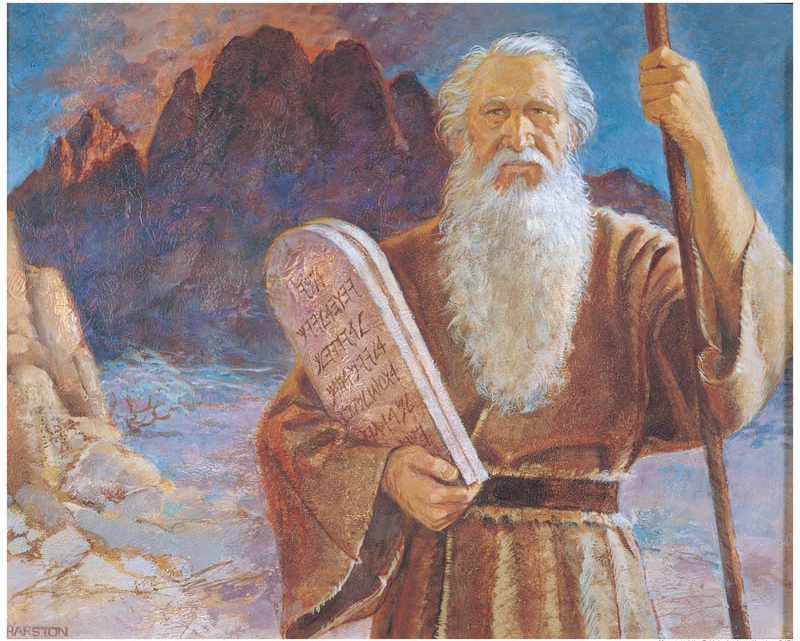Sabbath School Lesson for May 15-21, 2021
Overview for Lesson 8
The nature of the law was examined this week, so we may better understand how it relates to God’s covenant. Questions explored in this study were…
- Why God chose Israel to be a special people? (Sunday)
- How did the Law bring God closer to His people? (Monday)
- Where does the Law fit in relation to the covenant? (Tuesday)
- How permanent is the Law within the covenant? (Wednesday)
- What happens if we don’t keep the Law, and why? (Thursday)
We’ve seen that the covenant promises at Mount Sinai were especially meaningful for the Hebrews, as they left behind a long and cruel enslavement in Egypt. God’s will for them was lovingly outlined in all the statutes and ordinances given to Moses. If they followed the testimony of His law, they would continue to be safe from their enemies.
Memory Text: “Know therefore that the Lord your God is God; he is the faithful God, keeping the covenant of love to a thousand generations of those who love him and keep his commandments.” Deuteronomy 7:9 NIV
We often think of our need to be faithful to God, but we see from this verse that God is also faithful. He is faithful in keeping His promises to us, just as He expects us to be faithful in keeping His will, as expressed in His Law.
Notice also in this verse that it’s called the “covenant of love”. God gave the covenant to us out of love. But love is also mentioned, in our response to God. We first love him, and then we keep His commandments. Obedience is a vitally important expression of our love to a loving God.
Most will recall in Psalm 23 how God leads us “in the paths of righteousness”, but just exactly where are those paths and where do they lead? Psalm 119:35 reveals that God’s commandments are the “path of righteousness”, and the safest path for us to follow. His Law, when motivated by love, will guide us to the kind of righteousness that reflects most fully our loving Father.
Sunday: The Election of Israel
Sometimes we forget what Israel was chosen for. Although they were said to be a “holy nation” (set apart by God) and His peculiar treasure, they were also to be “a kingdom of priests” (Exodus 19:6). They were elected to carry God’s covenant message of hope and deliverance to all the nations around them.
Their election did not mean that they were saved, and the rest of the world was rejected. The tabernacle they were told to build in the wilderness was to be a “house of prayer for all nations” (Isaiah 56:7). The gospel message was to go to all the world, just as the disciples were told by Jesus before He went back to heaven (Matthew 28:19, 20).
Seventh-day Adventists are likewise elected to deliver a unique message to the world in these last days. The meaning of the three angels’ messages in Revelation 14 are among our distinct teachings about the Second Coming. This and other Bible truths, such as the seventh-day Sabbath, make us stand out from other Christian denominations in the world today.
This election does not, however, create for us a title to any exclusive right to the Kingdom of God. It merely means that we have a special message and calling, much the same as the Jews had under Abraham. We must be careful not to make the same mistakes as ancient Israel by getting too involved in worldly, sinful matters or by allowing pride to keep us from our mission to be “priests” and serve all those around us.
Bible Verses to Read and Discuss:
Deuteronomy 7:7, 8 and 10:22
- For what reason did God favor the nation Israel?
- How small was Jacob’s family when they first arrived in Egypt?
- Why do you think their numbers increased so much, even while under the harsh rule of Pharaoh?
Exodus 19:6, Isaiah 56:7, and Hebrews 2:9
- What kind of priests were the Israelites to be? What were their duties?
- Why was it important for God to reach the whole world with the message of salvation?
- What are some ways you and your local church can fulfill these same priestly duties?
Monday: Ties That Bind
If the covenant is about our relationship with God, then having rules and boundaries for that relationship are quite important. Every married couple discovers that rules or understandings are vital in keeping a marriage alive. Even friendships suffer when respect and trust are disregarded and common signs of courtesy are ignored.
Knowing what God expects of us helps us bind together with Him too. It allows us to grow spiritually with God in a relationship based on mutual love and respect. Grace does not eliminate our duty to honor the requirements God has clearly laid out for us in His Law.
Many Bible verses indicate that the words “law” (Psalm 78:10), “statutes” (Psalm 50:16), “testimonies” (Psalm 25:10), “commandments” (Psalm 103:18), and “word” of the Lord (Deuteronomy 33:9) are closely associated with the idea of a “covenant”. These boundaries, when observed, help us maintain a special relationship with God that could not happen otherwise. They are the “ties that bind”.
Bible Verses to Read and Discuss:
Jeremiah 11:8 and Psalm 51:10
- What has to happen to our heart for us to be able to obey God’s words in the covenant?
Psalm 51:12, 13
- How does having God’s Spirit in our hearts transform us into priests, and enable us to fulfill our promises in the covenant?
Tuesday: Law Within the Covenant
The word “Torah” in Hebrew, although translated “law”, really means “teaching” or “instruction”. The purpose of the laws and statutes, delivered by Moses, was to show His people how to live in a closer relationship with God. This, of course, is also the purpose of the covenant–to draw us closer to Him.
The Torah is considered to be the complete writings of Moses, or the first five books of the Old Testament, called the Pentateuch. These books contain a wide range of topics that instructed the Hebrews in matters of social issues, health, agriculture, civil government, and worship practices.
The observance of the requirements found in the Torah were essential for them to be able to understand the will of God. Many of the large encampment came out of Egypt with little to no knowledge of God. Obviously, there were many areas of lifestyle that needed guidance. God’s will had been obscured through their years of enslavement. But knowing God’s will through His law would help them get back on the right track.
Bible Verses to Read and Discuss:
Deuteronomy 10:12, 13 and 6:24, 25
- In what way were they to keep the commandments and statutes?
- How would the commandments be for their good?
Wednesday: The Stability of God’s Law
Some of the statutes and ordinances given to Moses were only applicable to that time and culture. However, the Ten Commandments, written by God’s own finger on two tablets of stone (Deuteronomy 9:10), were designed to be permanently binding on God’s people. They had a central place in the sanctuary, in the ark of the covenant itself, closest to God’s glorious Shekinah presence (Hebrews 9:4).
These ten rules define our duty to God and to our family, friends, and neighbors. They existed before Moses’ time and will have meaning for all eternity, because they embody God’s will and character, which is unchanging.
If God is to be close to us in a covenant relationship, we have to become like Him as much as humanly possible. Amos 3:3 tells us that if two walk together, they must be agreed. We must agree to let God’s Spirit help us become more like God in every way He has laid out for us. The Ten Commandments must, therefore, become our standard of behavior, so our characters can develop in a positive direction.
Bible Verses to Read and Discuss:
Malachi 3:6 and James 1:17
- What is there about God that is unchanging?
- Why is this unchanging nature important to our faith?
Amos 3:3
- How does the Law, when kept out of love, help show our agreement with God?
- What does being in agreement have to do with the covenant?
Thursday: If…
“If you will obey…” is a comment in Exodus 19:5 that we want to understand. The word “if” certainly means that the promised blessings would be conditional.
We find relief in God’s unconditional love for all mankind, but why are there now conditions spoken of? God loves us, no matter what. Jesus indicated love even for those who nailed Him to the cross (Luke 23:34). But when it comes to our salvation and eternal life, and for Israel, whether they would prosper or not, there seem to be conditions to be met.
This does not mean that grace is no longer a factor–that we alone are responsible for meeting the conditions. To the contrary, we need grace all the more to be able to follow all God’s directives and live according to His will. His love for us and our love for Him provide us with the motivation and ability to be faithful followers and secure our salvation.
His covenant, expressed so often in biblical history, allows us to understand what God expects of us, and what we can expect from Him throughout this process of redemption.
Bible Verses to Read and Discuss:
Genesis 18:19 and Exodus 19:5
- What did obedience have to do with God’s ability to keep His promises to, both Abraham and Moses?
- Why is obedience so important in the covenant?
Deuteronomy 5:33
- What advantage is there in obeying God’s Law?
- How does the Law show us how much God loves us?
Friday: Final Thoughts
The Law is perhaps one of the most difficult topics to tackle in the Bible. It seems like all of us have some type of aversion or misunderstanding when it comes to keeping the Law. Satan delights in our confusion and distaste for God’s Law. He knows that, properly kept, it is the “tie that binds” us to God in the most redemptive way. God’s character is reflected in His Law, and the longer we are kept away from it, the harder it will be to draw close to Him in a covenant relationship.
The easiest way to stay balanced in our obedience to the Commandments is to emphasize the love behind the Law. Jesus did exactly that when asked by the Pharisees, “which is the great commandment?” (Matthew 22:36). Quoting Deuteronomy 6:5, His answer included loving God with all our heart and our neighbor as ourselves.
Love was written all over the commandments, statutes, ordinances, and testimonies, given to Moses. God left no detail out of His expressed will during that intimate encounter on Mount Sinai. It was all part of the covenant He had shown to other faithful followers, like Noah, Abraham, Isaac, and Jacob.
The first words of Scripture, learned and memorized by Jewish children, is Deuteronomy 6:5, which tells us to love God with all our heart, soul, and strength. It’s part of the “Shema”, or Jewish creed. We, as Christians, should never separate ourselves from the love, embodied in the Law either. Keeping the Law is the purest, most complete application of love available to man.
Next Week: Sabbath: Covenant Sign
To read the Sabbath School Lesson Quarterly or see more resources for its study, go to








